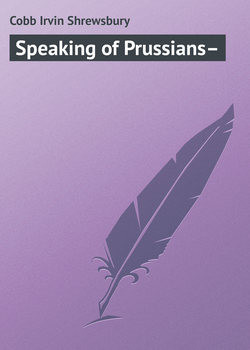Читать книгу Speaking of Prussians– - Cobb Irvin Shrewsbury - Страница 4
IV
ОглавлениеWhen I think back on those first stages – and in some respects the most tragic stages – of the great war, I do not see it as a thing of pomp and glory, of splendid panorama, pitched on a more impressive scale than any movement ever was in all the history of mankind. I do not, in retrospect, see the sunlight glinting on the long, unending, weaving lanes of bayonets; or the troops pouring in grey streams, like molten quicksilver, along all those dusty highroads of Northern Europe; or the big guns belching; or the artillery horses going galloping into action; or the trenches; or the camps; or the hospitals; or the battlefields. I see it as it is reflected in certain little, detached pictures – small-focused, and incidental to the great horror of which they were an unconsidered part – but which, to me, typify, most fitly of all, what war means when waged by the rote and rule of Prussian militarism upon the civilian populace of an invaded country.
I see again the little red-bearded priest of Louvain who met us on the day we first entered that town; who took us out of the panic of the street where the inhabitants fluttered about in aimless terror, like frightened fowl in a barnyard; and who led the way for us through a little wooden gateway, set in the face of a high brick wall. It was as though we were in another world then, instead of the little world of panic and distress we had just quit. About a neglected tennis court grew a row of pear trees, and under a laden grape arbour at the back sat four more priests, all in rusty black gowns. They got up from where they sat and came and spoke to us, and took us into a little cellar room, where they gave us a bottle of their homemade wine to drink and handfuls of their ripened pears to eat, and tried to point out to us, on a map, where they thought the oncoming Germans might be, none of us knowing that already uhlan scouts were entering the next street but one. As we were leaving, the eldest priest took me by the coat lapels and, with his kind, faded old eyes brimming and his gentle old face quivering, he said to me in broken English:
"My son, it is not right that war should come to Belgium. We had no part in the quarrel of these, our great neighbours. My son, we are not a bad people here – do not believe them should they tell you so. For I tell you we are a good people. We are a very good people. All the week my people work very hard, and on Sunday they go to church; and then perhaps they go for a walk in the fields. And that, to them, is all they know of life.
"My son," he said, "you come from a great country – you come from the greatest of all the countries. Surely your country, which is so great and so strong, will not let my little country perish from off the face of the earth?"
Because we had no answer for him we went away. And when, six weeks later, I returned to ruined and devastated Louvain, I picked my way through the hideous wreckage of the streets to the little monastery again. Behold! the brick wall was a broken heap of wrecked, charred masonwork; and the pear trees were naked stumps, which stood up out of a clay waste; and the little cellar room, where we ate our pears and drank our wine, was a hole in the ground now, full of ill-smelling rubbish and fouled water, with the rotted and bloated corpse of a dead horse floating in the water, poisoning the air with the promise of pestilence. And the priests who once had lived there were gone; and none in all that town knew where they had gone.
Always, too, when thinking of the war, I think of the refugees I saw, but mostly of those I saw after Antwerp had fallen in the early days of October and I was skirting Holland on my way back out of Germany to the English Channel. I had seen enough refugees before then, God knows! – men and women and children, old men and old women and little children and babies in arms, fleeing by the lights of their own burning houses over rainy, wind-swept, muddy roads; vast caravans of homeless misery, whose members marched on and on until they dropped from exhaustion. And when they had rested a while at the miry roadside, with no beds beneath them but the earth and no shelters above them but the black umbrellas to which they clung, they got up and went on again, with no destination in view and no goal ahead; but only knowing, I suppose, that what might lie in front of them could not be worse than what they left behind them. But never – until after Antwerp – did there seem to be so many of them, and never did their plight seem so pitiable. Over every road that ran up out of Belgium into Holland – and that in this populous corner of Europe meant a road every little while – they poured all day in thick, jostling, unending, unbroken streams. I marked how the sides of every wayside building along the Dutch frontier was scrawled over with the names of hundreds of refugees, who already had passed that way; and, along with their names, the names of their own people, from whom they were separated in the haste and terror of flight, and who – by one chance in a thousand – might come that way and read what was there written, and follow on.
